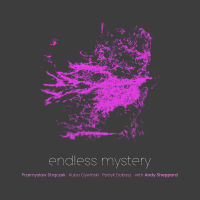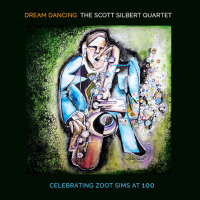Home » Jazz Articles » Geof Bradfield
Jazz Articles about Geof Bradfield
Geof Bradfield Quintet: Our Roots
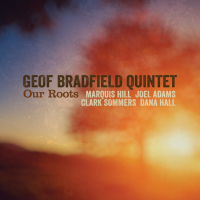
by C. Michael Bailey
Tenor saxophonist Geof Bradfield's inspiration for Our Roots came from Clifford Jordan's Huddie “LeadBelly" tribute, These are my Roots: Clifford Jordan plays Leadbelly (Atlantic, 1965). While there is a bit of overlap in material from both recordings, Bradfield adopts a very different format for his presentation. Jordan employed a standard jazz rhythm section, while Bradfield eschews a harmony instrument in preference to a three-horn front. It is no mistake that this recording recalls alto saxophonist Ornette Coleman's seminal Atlantic recordings ...
Continue ReadingGeof Bradfield: Our Roots

by Mark Corroto
Without the blues, there would be no jazz, and arguably, no rock-and-roll. Think about it, if there were no rock-and-roll, Mick Jagger and Keith Richards, who stole every American blues lick they could find in the 1960s, would have had to get real jobs. Jazz musicians suffer no illusions that their music wasn't born of the African-American blues tradition and its music is unequaled when it deals overtly with this tradition. Saxophonist Geof Bradfield is a skilled composer ...
Continue ReadingGeof Bradfield Quintet: Our Roots

by Dan McClenaghan
Discussing “roots" in the context of jazz, a good starting point is the Mississippi delta, down in New Orleans, where the music of trumpeters King Oliver and Louis Armstrong grew strong. And then there's the rich earth of the delta in north western Mississippi, up near Clarksdale, where the blues grew and blossomed. The roots from both these areas were, of course, transplanted from Africa. Chicago-based saxophonist Geof Bradfield follows up his marvelous Melba! (Origin Records, 2013) with ...
Continue ReadingGeof Bradfield: Melba!
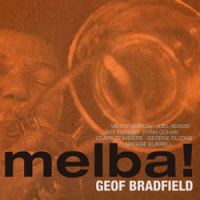
by Hrayr Attarian
Chicago based saxophonist Geof Bradfield's Melba! is a much needed tribute to the criminally underexposed trombonist and arranger Melba Liston. Liston debuted with trumpeter, bandleader Gerald Wilson, was one of the stars of trumpeter Dizzy Gillespie's bebop big band and devoted herself to arranging after she met pianist Randy Weston with whom she had a long and fruitful career.Commissioned by Chamber Music America's 2011 New Jazz Works program and funded by the Doris Duke Charitable Foundation this ambitious ...
Continue ReadingGeof Bradfield: Melba!

by Dan McClenaghan
Melba Liston (1926-1999) isn't one of the big names that comes up when great jazz composer/arrangers are mentioned, but it should be. Starting as a trombonist with some of the greats--Dizzy Gillespie, Dexter Gordon, Count Basie, Art Blakey--she soon began working with Randy Weston, arranging the pianist's composition on Uhuru Africa, (Roulette Records, 1960) and Highlife (Roulette Records, 1961). She also wrote the charts for saxophonist Johnny Griffin, vibraphonist Milt Jackson, drummer Elvin Jones and bassist Charles Mingus. Fast forward ...
Continue ReadingGeof Bradfield: African Flowers
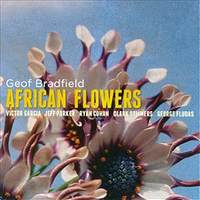
by Mark Corroto
Saxophonist Geof Bradfield's experiences traveling and performing in Rwanda, Congo, Uganda, and Zimbabwe in 2008 were the inspiration for African Flowers. Bradfield was a member of pianist Ryan Cohan's quartet, and the band took part in a US State Department/Jazz at Lincoln Center tour. This extended work for sextet features excellent writing and strong musicianship from Cohan, guitarist Jeff Parker, trumpeter Victor Garcia, bassist Clark Sommers and drummer George Fludas.African Flowers follows the quartet release Urban Nomad (Origin, ...
Continue ReadingGeof Bradfield: Urban Nomad
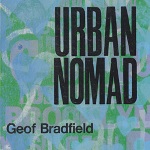
by John Barron
On Urban Nomad, Chicago saxophonist Geof Bradfield and his powerhouse quartet perform with tremendous spirit, maintaining a momentum that is vibrant and infectious. Bradfield's inventive, yet tightly-focused tenor and soprano playing is propelled by pianist Ron Perrillo, drummer George Fludas and bassist Clark Sommers, soaring through a mostly original set of charged-up progressive jazz.
Bradfield's compositions are full of shifting time signatures and lush harmonies. Most compelling, however, is the way the Columbia College instructor intertwines rhythmic and melodic motifs ...
Continue Reading


